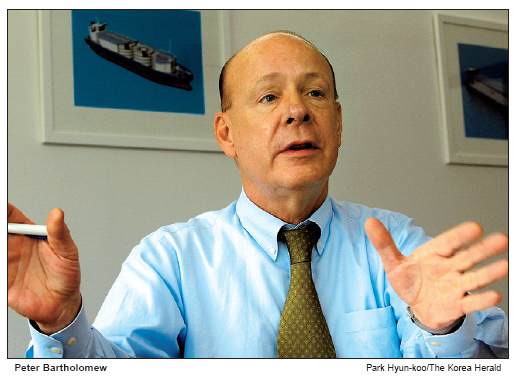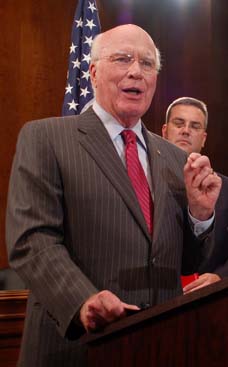
Redevelopment, he said, should be practiced in destitute areas that truly need to be improved. Even in areas that require fundamental restructuring, the residents' opinions should be respected to a certain point, he said. He also pointed out that the present system of laws and the civil servant society were largely influenced by former President Park Chung-hee's ideas. "Back then, the government forced people to revere the new and the West, and to disdain the old and the traditional," he said. "Such decades-long disregard for the tradition has led to the Korean people's apathy and ignorance about their own cultural inheritance." During his long resistance to the city's redevelopment plan, Bartholomew has had to persuade his neighbors to join the preservation attempts as some of them were often tempted to sell out their old houses and move out. "The hanok in our neighborhood are not just antique, uncomfortable buildings," he explained. "Every pillar, every piece of wood, every line reflects the Korean spirit and its reverence towards philosophy and beauty." Most of his Korean neighbors, however, had never learned to appreciate the hidden meanings in their houses until they heard them from an outsider such as himself. "Once they saw the true value of their hanok, many of them gained pride about their houses and refused to let them be demolished," he said. He added that the Korean people's lack of concern for their own traditions, including hanok, has also discouraged non-Koreans in taking an interest in it. "In the old days, foreign visitors were fascinated by the Oriental scenery and spirit found in Korea," he said. "However, nowadays, they hardly step out to experience the culture at all and tend to stay within their expat communities." Despite his passion, Seoul City officials and some Seosomun-dong residents regard the hanok cluster as a decrepit area that needed to be replaced. Bartholomew counters their view by suggesting an alternative option. "I suggest that this valuable hanok neighborhood be developed into a cultural district, open to visitors," he said. "It is not just the grand palaces and temples that are worth preserving and visiting."
Peter Bartholomew, who arrived in Korea in 1968 as a member of the Peace Corps, soon became an admirer of Korean culture, especially its traditional architecture
American eye cherishes beauty lost on Koreans
This is the seventh in a series of articles introducing foreigners who have chosen to pursue their life passion in Korea. - Ed.
By Bae Hyun-jung
In Korea, a country which so highly values speed and development, the beauty of its traditional culture may easily elude the eyes of locals, said an American in his 41st year of residing in Korea.
Peter Bartholomew, managing director of a business development consulting firm, is better known to the Korean public for his passion for "hanok," or traditional Korean houses.
He also chairs the Korean branch of the Royal Asiatic Society.
Bartholomew, who arrived in Korea in 1968 as a member of the Peace Corps, soon became an admirer of Korean culture, especially its traditional architecture.
"I have always been deeply interested in historical buildings," he said. "Even when I was living in the United States, I was impressed with the well-preserved 18th and 19th century buildings."
For the last three decades, he has lived in an old hanok located in Dongsomun-dong, northern Seoul, where there are several old hanok-clustered neighborhoods.
"Many dissuaded me from buying the house back then, telling me that it was just an old, uncomfortable building which would never be appreciated in the real estate market," he said. "However, this hanok has filled my life with peace and beauty for the last few decades, and this, I think, is the true value of a house."
He and other hanok residents in his neighborhood recently won a two-year-long lawsuit against Seoul City's attempt to redevelop the hanok area.
The Seoul Administrative Court in June ruled in favor of Bartholomew and his neighbors, who filed a suit in 2007 against the Seoul mayor requesting that the inaccurate assessment of the buildings in the redevelopment area be annulled.
Though the court's decision did not entirely exempt hanok from demolition in the future, it did set back the redevelopment plan which had been imminent.
Bartholomew, who has studied related Korean laws to defend his home, points out that the city's plans are largely based on the present architecture law.
"The present law unilaterally states that a building is of no value after 20 years from construction, without even inspecting its actual status," said Bartholomew.
Not only does the law result in the waste of valuable old buildings, it also causes builders to neglect the durability of a building, as they expect it to be demolished in 20 years anyway, he said.
"In the West, old means traditional, national and worthy of pride, but in the East, especially in the modern times, old seems to be equal to bad, outdated and unworthy. Sometimes, it takes an outsider's eye to truly appreciate the value of a traditional culture."
Redevelopment, he said, should be practiced in destitute areas that truly need to be improved.
Even in areas that require fundamental restructuring, the residents' opinions should be respected to a certain point, he said.
He also pointed out that the present system of laws and the civil servant society were largely influenced by former President Park Chung-hee's ideas.
"Back then, the government forced people to revere the new and the West, and to disdain the old and the traditional," he said. "Such decades-long disregard for the tradition has led to the Korean people's apathy and ignorance about their own cultural inheritance."
During his long resistance to the city's redevelopment plan, Bartholomew has had to persuade his neighbors to join the preservation attempts as some of them were often tempted to sell out their old houses and move out.
"The hanok in our neighborhood are not just antique, uncomfortable buildings," he explained. "Every pillar, every piece of wood, every line reflects the Korean spirit and its reverence towards philosophy and beauty."
Most of his Korean neighbors, however, had never learned to appreciate the hidden meanings in their houses until they heard them from an outsider such as himself.
"Once they saw the true value of their hanok, many of them gained pride about their houses and refused to let them be demolished," he said.
He added that the Korean people's lack of concern for their own traditions, including hanok, has also discouraged non-Koreans in taking an interest in it.
"In the old days, foreign visitors were fascinated by the Oriental scenery and spirit found in Korea," he said. "However, nowadays, they hardly step out to experience the culture at all and tend to stay within their expat communities."
Despite his passion, Seoul City officials and some Seosomun-dong residents regard the hanok cluster as a decrepit area that needed to be replaced.
Bartholomew counters their view by suggesting an alternative option.
"I suggest that this valuable hanok neighborhood be developed into a cultural district, open to visitors," he said. "It is not just the grand palaces and temples that are worth preserving and visiting."
During his years-long struggle to preserve and promote hanok, his prime motive has always been his deep devotion to the beauty of Korean culture, he said.
"Had my house been an ordinary modern building, I would have moved out with whatever money the government offered," he said. "However, this journey is not about money at all, but about guarding the personal peace that I have enjoyed in my hanok and the cultural beauty that may never be truly restored once lost."
(tellme@heraldm.com)













